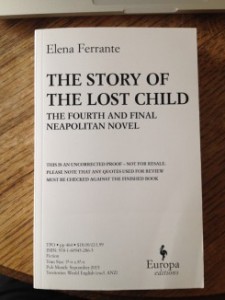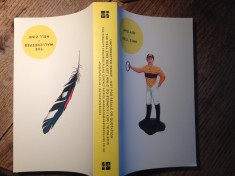June 24, 2015
Advanced Advance Reading Copies
by Zeljka Marosevic
 The season of big books won’t be upon us until the Autumn, so this is the season of most anticipated books, a time where we move through the present but live in the future.
The season of big books won’t be upon us until the Autumn, so this is the season of most anticipated books, a time where we move through the present but live in the future.
While many readers use summer to catch up on all the books they haven’t read during the rest of the year, publishers big and small have already launched their campaigns to ensure their lead Autumn titles will be in the suitcase of every literary editor, reviewer and influential reader. Not the finished versions of these books, but rather advanced reading copies. And this summer, ARCs seem more advanced than ever.
The reasons for this are manifold, and include the advance in printing technology which means in-house digital printers are now common in big publishing houses. These allow larger quantities of proofs to be printed more quickly and cheaply than ever before. And as much of the book market becomes polarised into ‘blockbusters’, and ‘everything else’, there is more riding on the big books to be bigger and work harder earlier, to justify their astronomical advances.
But social media is undeniably the biggest reason for this shift. Picture the scene before the arrival of the internet: a literary editor or reviewer receives a much-anticipated proof of a much-anticipated novel. They open it at their desk. They smile. They turn it over in their hands. They put it in their satchel for later. Maybe over after-work drinks someone asks, ‘reading anything good?’ The proof is mentioned, it emerges, is nodded over, is put away again.
Now, it’s a hallmark of literary Twitter that advance copies are photographed and broadcast to followers, very often starting Twitter conversations and building that all important “early buzz” for a forthcoming book. The short conversation over dinner has now become public and is amplified via discussion, retweets and favourites.
One no longer has to read or review a book before they can start publicising it. Part of the fun is just having it to show off. A case in point:
This will not need extra hype so this is just to show off and say, yes, we have a copy of City on Fire: pic.twitter.com/ARWCNdTDsA
— The White Review (@TheWhiteReview) May 8, 2015
So, just how have ARCs become advanced? And how, in a world where every ARC can have its fifteen minutes of fame on Twitter can publishers ensure their galley stands out from the rest? Let me count the ways.
The Hallberg Boxset
Upon acquiring Garth Risk Hallberg’s City on Fire for a strong six-figure-deal in the UK, Alex Bowler, Senior Editor at Jonathan Cape said of the 900-page novel, “I wouldn’t use other books as comparisons. It’s more like an HBO box set.” And so, as well as a conventional doorstopper of a proof, Jonathan Cape announced they would also be printing a “limited edition boxset superproof.” The imprint’s Publicity Director Joe Pickering made the announcement over Twitter. His feed was then filled with a flurry of lucky recipients tweeting pictures of their very own editions.
The proof is divided according to the 7 books of the novel, each with a unique design. #CityonFire pic.twitter.com/xIwKPWzuov — Joe Pickering (@Joethepublicist) June 12, 2015
927 pages. 94 chapters. 9 epigraphs. 7 books. Hold on to your hats, it’s Garth Risk Hallberg’s CITY ON FIRE. Out Oct. pic.twitter.com/HQZ2zwDiGU — John Self (@john_self) June 17, 2015
The Nell Zink Flip
What to do when you’re launching one of the surprise American hits of 2014 in Britain, but she’s written not one, but two debut novels? You do like Fourth Estate, and you do the flip.
The Verso ARC party
In September, Verso will publish writer and critic Juliet Jacques’ memoir, TRANS. Jacques’ book has been anticipated since 2010, when she began recording her gender reassignment process in a series of columns for The Guardian; the series was subsequently longlisted for the Orwell Prize. Verso is marking the occasion by throwing a galley party for the book. Book launches are common practice, galley parties are at the cutting edge.
Europa’s Anonymous ARC
Who is Elena Ferrante? Who cares. The fourth and final instalment of the Neapolitan Novels is released in September and Ferrante Fever is already building. A simple tweet announcing the arrival of the galleys was enough to start a small frenzy:
They are here, they are here! #ferrrantefever pic.twitter.com/hz3qEveoAu — Daniela EuropaUK (@DanielaPetracco) May 22, 2015
The secret to Europa’s advanced ARC lies in its simplicity. White with plain black print and without images, it laughs in the face of fancy production and expensive effects. Like the author herself who wants only to write the books and stay out of their promotion, the ARC is presented with no embellishments, just the text itself. That is, after all, everything we’ve been waiting for. And some of us are more pathetic and desperate than others:
I promised @DanielaPetracco my firstborn in exchange for this, and it was so worth it: pic.twitter.com/WWpVW5ImEP
— Željka Marošević (@ZeljkaMarosevic) June 16, 2015
Zeljka Marosevic is the managing director of Melville House UK.
